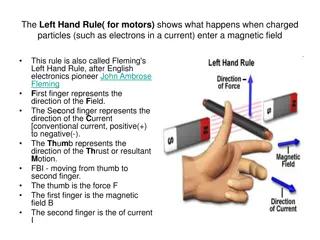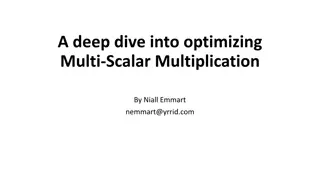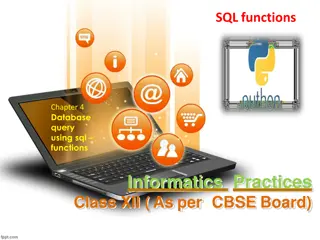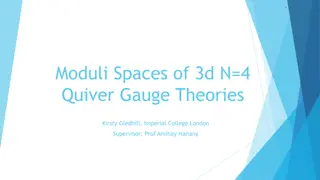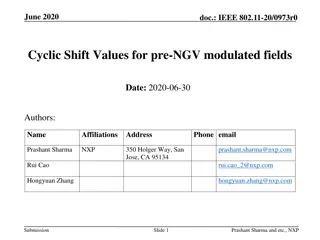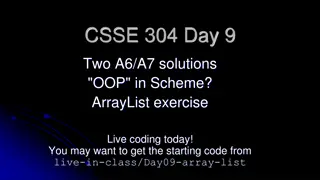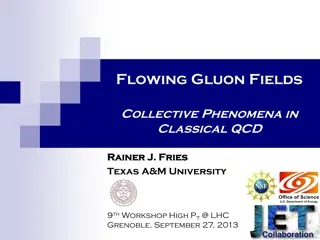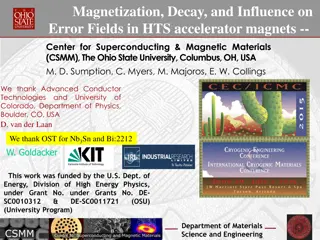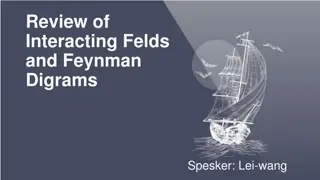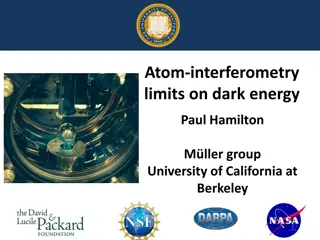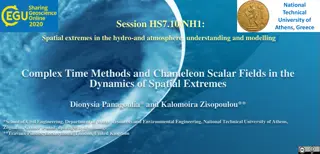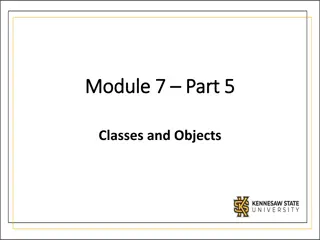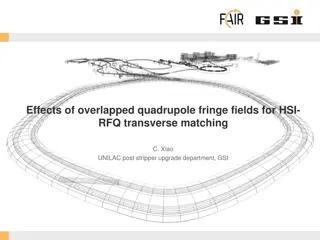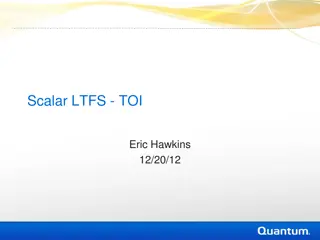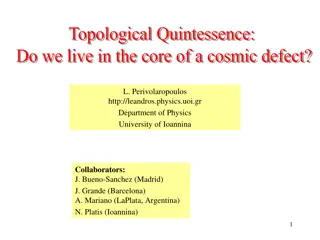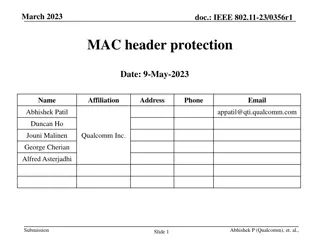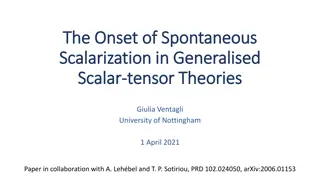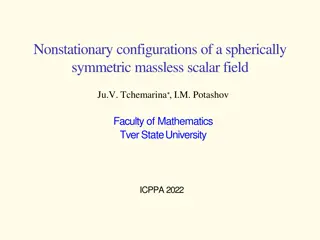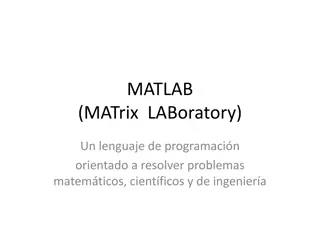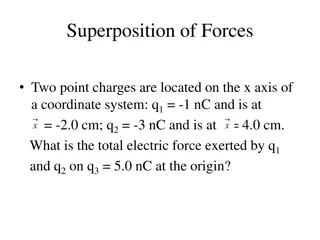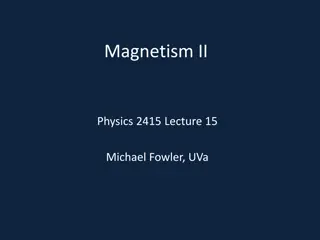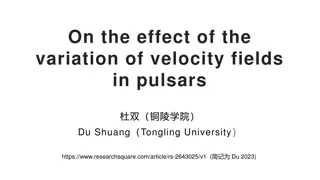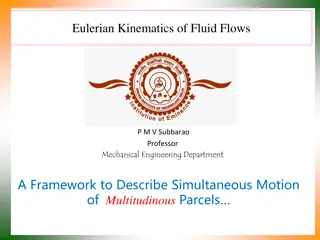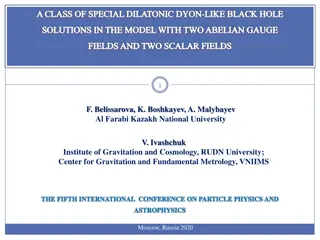Understanding Ampere's Law and Magnetic Fields in Wires
Explore the basic premise and elementary applications of Ampere's Law in calculating magnetic fields around wires. Learn how to determine the magnetic field strength at various distances from a wire carrying current, and comprehend the force between two parallel wires due to magnetic fields. Dive in
7 views • 11 slides
Basic Principles of MRI Imaging
MRI, or Magnetic Resonance Imaging, is a high-tech diagnostic imaging tool that uses magnetic fields, specific radio frequencies, and computer systems to produce cross-sectional images of the body. The components of an MRI system include the main magnet, gradient coils, radiofrequency coils, and the
2 views • 49 slides
Understanding Date Fields in Contract Management Systems
Contract management systems often have specific date fields that serve different purposes. Effective Dates, Period of Performance Start Dates, and Completion Dates all have unique functions and must be accurately reported in systems like FPDS. It is crucial to understand the differences between thes
3 views • 7 slides
Understanding Vector Operations in Linear Algebra
Explore the world of vector operations in linear algebra through this detailed presentation. Learn about vector addition, scalar multiplication, field operations, and more. Gain insights into the notation of Fn and the significance of scalar multiplication and vector addition in linear algebra. Whet
8 views • 9 slides
Exploring Magnetic Fields and Earth's Magnetism
Uncover the fascinating world of magnetic fields, from the historical discoveries of magnetism to understanding the Earth's magnetic field and its poles. Dive into the concepts of magnetic forces, field lines, and the direction of Earth's magnetic field over time. Discover the properties of magnetic
1 views • 24 slides
Understanding Magnets and Magnetic Fields
Explore the fascinating world of magnets and magnetic materials. Discover how magnets have two poles, North and South, and how they interact with each other. Learn about magnetic materials like iron, cobalt, and nickel, and understand the concept of magnetizing and demagnetizing. Dive into the magne
0 views • 15 slides
Magnetic Field Problems: Protons, Wires, and Charged Ions
Solve various problems related to magnetic fields, including determining forces on protons, calculating magnetic forces on wires with currents, finding the radius of paths for charged ions in magnetic fields, and more. Understand concepts such as magnetic forces, circular orbits, and interactions be
0 views • 10 slides
Understanding Fleming's Left Hand Rule and Electric Motors
Fleming's Left Hand Rule, also known as the Left Hand Rule for Motors, explains the interaction between charged particles and magnetic fields. Electric motors utilize this principle to convert electrical energy into mechanical energy through the interaction of magnetic fields and current-carrying co
2 views • 6 slides
Exploring Quantum Chromodynamics and Effective Potential in Vacuum Physics
Delve into the intricacies of Quantum Chromodynamics and the concept of effective potential in the context of vacuum physics. Discover how quarks, leptons, photons, W and Z bosons, gluons, and the Higgs boson play crucial roles in shaping the fundamental structures of the quantum vacuum. Explore the
1 views • 11 slides
Optimizing Multi-Scalar Multiplication Techniques
Delve into the world of optimizing multi-scalar multiplication techniques with a focus on improving performance, especially in Zero Knowledge Proofs systems using elliptic curves. Explore algorithmic optimizations like the Bucket Method by Gus Gutowski and learn about the runtime breakdown, motivati
3 views • 52 slides
Understanding SQL Functions for Database Queries
SQL functions are essential elements in performing actions and obtaining results in a database query. They come in two main types: scalar functions and aggregate functions. Scalar functions operate on single values, while aggregate functions operate on sets of data. Examples of SQL functions include
0 views • 14 slides
Exploring Moduli Spaces of 3D N=4 Quiver Gauge Theories
Study the rich moduli spaces and symmetries in 3D N=4 quiver gauge theories, analyzing superpartners, scalar fields, and the natural splitting of moduli space into Coulomb and Higgs branches. Gain insights into SUSY theories, duality, and potential applications in string theory and geometry.
0 views • 8 slides
IEEE 802.11-20/0973r0 Cyclic Shift Values for Pre-NGV Modulated Fields
Introduction to the determination of cyclic shift values for pre-NGV modulated fields in the IEEE 802.11-20/0973r0 document. The proposal suggests using existing values defined for pre-VHT, specifically for L-STF, L-LTF, L-SIG, and VHT-SIG-A fields of the PPDU. References and a straw poll are also i
2 views • 5 slides
Exploring Object-Oriented Programming in Scheme
The content discusses implementing object-oriented programming concepts in Scheme, focusing on encapsulation through fields and methods. It explores representing objects and manipulating fields exclusively through methods. The tutorial covers creating objects, defining methods, and accessing fields
2 views • 13 slides
Understanding Flowing Gluon Fields and Color Glass Phenomena in QCD
Explore the collective phenomena of gluon fields in classical QCD, focusing on the Standard Model of URHICs, Color Glass, and Gluon Fields in the Forward Lightcone. The research delves into topics like local thermal equilibrium, viscous hydrodynamics, and the interaction of probes with quarks and gl
0 views • 24 slides
Robust Parity Test for Extracting Parallel Vectors in 3D
Fundamental primitives for visualizing 3D data include line features like ridges and valleys of a scalar field, stream lines of a vector field, vortices of a velocity field, and extremal curves of a tensor field. Parallel Vectors (PV) provide a unified representation of 3D line features, forming con
0 views • 27 slides
Data Warehouse Student User Group Meeting Updates March 20, 2019
Updates from the Data Warehouse Student Data Users Group meeting on March 20, 2019 include repurposed course inventory fields, addition of new military-affiliated student fields, and changes in Curriculum Management system functionality. Key changes involve labeling and retirement of certain data el
1 views • 16 slides
Magnetization, Decay, and Error Fields in HTS Accelerator Magnets
The research conducted at The Ohio State University focuses on understanding the magnetization, decay, and influence of error fields in high-temperature superconducting (HTS) accelerator magnets. The study explores the impact of different superconducting materials such as Nb3Sn, YBCO, and Bi:2212 on
0 views • 21 slides
Understanding Interacting Fields and Feynman Diagrams in Quantum Field Theory
Delve into the fascinating world of quantum field theory with a focus on interacting fields and Feynman diagrams. Explore perturbation theory, correlation functions, Wick's theorem, and Feynman diagram rules to gain insights into preserving causality, calculating two-point correlation functions, and
0 views • 18 slides
Understanding Classical Mechanics and Fields in Physics
Explore the concepts of radiation, matter, fields, Hamiltonian, and more in classical mechanics with a focus on velocity-dependent potentials and conservative systems. Dive into the detailed discussions on gauge theory, Coulomb gauge, magnetic fields, and Hamiltonian operators within the framework o
0 views • 28 slides
Limits on Dark Energy Using Atom Interferometry - UC Berkeley Study
Research conducted by Paul Hamilton Müller's group at the University of California, Berkeley, focuses on using atom interferometry to explore dark energy. The study delves into screened scalar fields as dark energy, future reach with atom interferometry, known unknowns related to dark energy densit
0 views • 39 slides
Understanding Spatial Extremes: Complex Time Methods in Hydro-Atmospheric Dynamics
This study explores the use of complex time methods and chameleon scalar fields in understanding and modeling spatial extremes in hydrological and atmospheric systems. By transforming Lagrangian processes and introducing chameleon scalar fields, the research unveils new insights into the mechanism g
0 views • 9 slides
Understanding Classes and Objects in Python and Java
Python and Java both utilize classes and objects in their programming paradigms. While there are syntax differences, the fundamental concepts remain similar. Fields and constructors are key components in defining classes, with Python using shared fields until assignments are made and Java focusing o
1 views • 6 slides
Investigation of Overlapped Quadrupole Fringe Fields for HSI-RFQ Transverse Matching
General introduction to the study on quadrupole fringe fields, focusing on investigating the effects of overlapped fringe fields on HSI-RFQ transverse matching by introducing a new QQ focusing system and measuring transmission efficiency with comparisons between simulations and experiments. The stud
0 views • 17 slides
Understanding Scalar LTFS: Best Practices and Key Tips
Explore the fundamentals of Scalar LTFS, a linear tape-based filesystem, including setup, operations, and best practices for efficient usage. Learn about key recommendations such as NFS version 4 on Linux, handling extents, and tape management strategies.
0 views • 12 slides
Tidal Deformability of Compact Stars Admixed with Scalar Fields Research Summary
Researchers like C. J. Horowitz and Kwing-Lam Leung are exploring the effects of dark matter, scalar fields, and ultra-light dark matter on compact stars like neutron stars. Methods involve calculating tidal love numbers, using energy-momentum tensors, and studying equilibrium solutions. The study a
0 views • 20 slides
Topological Quintessence: Anomalous Cosmic Anisotropies and Dark Flow Directions
The consistency of Cold Dark Matter (CDM) with observational data has improved over the past decade, but tensions remain with various cosmic anomalies such as preferred anisotropy axes and dark flow directions. Topological Quintessence, a physical mechanism proposed by L. Perivolaropoulos and collab
0 views • 26 slides
Understanding Electric Fields: Fundamentals and Concepts
Electric fields are created by surrounding charges and are represented by vectors indicating the force experienced by a test charge. Electric field lines help visualize the direction and strength of the field, with denser lines indicating stronger fields. The electric field due to a point charge can
0 views • 13 slides
Vulnerabilities in Unprotected MAC Header Fields in IEEE 802.11 Standard
The document discusses the risks associated with unprotected fields in the MAC header of MPDUs in IEEE 802.11 standards, highlighting how these fields can be vulnerable to attacks leading to adverse effects on receivers. Fields like Frame Control, Sequence Control, and QoS Control are identified as
0 views • 10 slides
Understanding Spontaneous Scalarization in Gravitational Theories
Spontaneous scalarization presents a unique phenomenon where compact objects experience field growth triggered by tachyonic instability, leading to stable field configurations. Explored in various theories, such as Horndeski gravity and scalar Gauss-Bonnet gravity, spontaneous scalarization is studi
0 views • 18 slides
Nonstationary Configurations of a Spherically Symmetric Scalar Field
Action and stress-energy tensor, Einstein-Klein-Gordon equations, and method for constructing nonstationary configurations of a spherically symmetric scalar field are discussed in this study. The behavior of the characteristic function allows interpretations such as black holes, wormholes, or naked
0 views • 14 slides
Introduction to MATLAB: A Powerful Tool for Mathematical Problem Solving
MATLAB, short for MATrix LABoratory, is a programming language designed to tackle mathematical, scientific, and engineering problems. It is well-suited for working with matrices, vectors, and sequences of numbers, in addition to offering various functions for scalar operations like calculating lengt
0 views • 12 slides
Principles of Management According to Fayol
Fayol's 14 Principles of Management include concepts such as centralisation and decentralisation, scalar chain, and order. Centralisation concentrates decision-making authority at the top level, while decentralisation disperses it across management levels. Scalar chain emphasizes the formal lines of
0 views • 29 slides
Electric Charges and Fields in Physics
Explore topics such as superposition of forces, electric fields, particle interactions, potential differences, and cathode-ray tube concepts in physics involving charges, forces, and fields. Understand scenarios like calculating total electric force between charges, finding electric fields at specif
0 views • 10 slides
Understanding Image-Based Rendering and Light Fields
Exploring the concepts of Image-Based Rendering (IBR) and Light Fields through a historical perspective, pros and cons analysis, basic approaches, and recent developments in the field. IBR offers photorealistic image capture and representation, with advancements like data-driven graphics and appeara
0 views • 43 slides
Understanding Magnetism: Forces, Fields, and Applications
Explore the fascinating realm of magnetism in Physics as you delve into topics such as forces on charged particles, path of particles in magnetic fields, torque on current loops, and Earth's magnetic field alignment. Learn about the force on straight wires and electric charges in magnetic fields, an
0 views • 14 slides
Impact of Velocity Field Variations on Pulsar Magnetic Fields
The study explores how variations in velocity fields affect pulsar magnetic fields, highlighting the conversion of kinetic energy to magnetic energy in pulsars. Glitches in these systems can lead to changes in magnetic fields, influencing pulsar emissions. The maintenance of stable magnetic fields a
0 views • 14 slides
Understanding Material Derivative in Fluid Mechanics
Fluid flows are described using Eulerian kinematics and material derivative concepts, highlighting the changes in scalar and vector fields. The acceleration and components of material acceleration are explored, along with visualizations of material acceleration. Trajectories and displacements of flu
0 views • 13 slides
Understanding Vectors: Concepts, Operations, and Applications
Vectors are quantities defined by magnitude and direction, essential in various fields like physics and mathematics. Learn about vector properties, examples, operations like addition and multiplication, as well as applications such as understanding displacement, velocity, and acceleration. Dive into
0 views • 20 slides
Special Dilatonic Dyon-Like Black Hole Solutions in Two-Field Model
A class of special dilatonic dyon-like black hole solutions in a model with two Abelian gauge fields and two scalar fields is explored. Motivation for the study includes dimensional reduction of supergravity models and manifestations of dark matter. The solutions involve black hole dyon solutions, a
0 views • 12 slides







